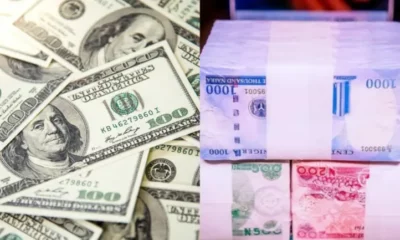Top Stories
Explainer: What the NNPCL and AfreximBank $3 billion loan means

O’tega Ogra, the Senior Special Assistant to President Bola Ahmed Tinubu on Digital and New Media has provided some insights into understanding the $3 billion crude repayment loan signed between the Nigerian National Petroleum Company Limited and AfreximBank that was announced earlier today.
Ogra wrote via his Twitter account that Nigerians should know the key highlights regarding the loan, they are as follows;
What is the $3 billion loan about?
The NNPC Ltd. secured an emergency $3 billion crude oil repayment loan from AFREXIM Bank. This is not a crude-for-refined products swap but an upfront cash loan against proceeds from a limited amount of future crude oil production.
Is this loan risky for NNPC Ltd. or the Nigerian Treasury?
No. The exposure for NNPC Ltd. is very limited, covering just a fraction of their entitlements. Additionally, there are no sovereign guarantees tied to this loan.
What’s the benefit of this loan to Nigeria?
The loan will assist NNPC Ltd. in settling taxes and royalties in advance. It will also equip the Federal Government with the necessary dollar liquidity to stabilize the Naira, with limited risk.
How will the loan be disbursed?
The funds will be released in stages or tranches based on the specific needs and requirements of the Federal Government.
Will this affect fuel prices?
A strengthened Naira as a result of this initiative will lead to a reduction in fuel costs. This means that if the Naira appreciates in value, the cost of fuel will drop, and further increases will be halted.
What about subsidies? Are they coming back?
No. A stronger Naira will result in lower prices from the current level, making subsidies unnecessary. The deregulation policy remains unchanged.
How will the loan be repaid?
The loan will be repaid against a fraction of proceeds from future crude oil production. It’s a strategic move that ensures a balance between our current economic needs and future production capabilities.
What is the difference between this and previous swap deals?
This is not crude for refined products agreement where the government does not earn any proceeds from the swap.
What you should know
The Tinubu administration is facing two dilemmas when it comes to the oil sector – rising crude prices on the international market which inevitably affect fuel pump prices and the foreign exchange rate crisis which hampers continuous importation of refined petroleum products into the country as Nigeria has no functional refinery as of this moment.
The crude repayment loan is a way for the government to resolve these issues without creating more burdens for the citizenry.


 Top Stories6 hours ago
Top Stories6 hours agoI’m not prepared to downsize my cabinet — Tinubu

 News6 hours ago
News6 hours agoBREAKING: “I Have No Regrets” – Tinubu Defends Fuel Subsidy Removal Amid Economic Hardship [VIDEO]

 Top Stories36 minutes ago
Top Stories36 minutes agoBreaking: Ibadan Stampede: Court Orders Remand Of Ooni’s Ex-Wife, School Principal

 Entertainment3 hours ago
Entertainment3 hours agoJay-Z has no ‘plans to show loyalty to longtime friend Diddy’ as he battles r@pe allegation

 Sports2 hours ago
Sports2 hours agoGOAT: Who said Messi is better than me – Cristiano Ronaldo

 Entertainment3 hours ago
Entertainment3 hours agoRegina Daniels reveals the best way to predict one’s future as she shares more photos from her vacation

 Politics5 hours ago
Politics5 hours agoI will not downsize my cabinet — Tinubu vows

 Breaking News5 hours ago
Breaking News5 hours agoNaira appreciates massively against dollar ahead Christmas holidays







